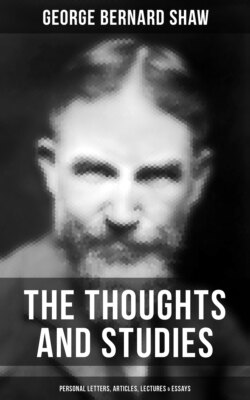Читать книгу The Thoughts and Studies of G. Bernard Shaw: Personal Letters, Articles, Lectures & Essays - George Bernard Shaw - Страница 11
На сайте Литреса книга снята с продажи.
THE AUTOBIOGRAPHICAL ANTI-IDEALIST: EXTRAVAGANZAS BRAND, 1866
ОглавлениеTable of Contents
We are now prepared to learn without misgiving that a typical Ibsen play is one in which the leading lady is an unwomanly woman, and the villain an idealist. It follows that the leading lady is not a heroine of the Drury Lane type; nor does the villain forge or assassinate, since he is a villain by virtue of his determination to do nothing wrong. Therefore readers of Ibsen — not playgoers — have sometimes so far misconceived him as to suppose that his villains are examples rather than warnings, and that the mischief and ruin which attend their actions are but the tribulations from which the soul comes out purified as gold from the furnace. In fact, the beginning of Ibsen’s European reputation was the edification with which the pious received his great dramatic poem Brand. Brand is not his first play: indeed it is his seventh; and of its six forerunners all are notable and some splendid; but it is in Brand that he definitely, if not yet quite consciously, takes the field against idealism and, like another Luther, nails his thesis to the door of the Temple of Morality. With Brand therefore we must begin, lest we should be swept into an eddy of mere literary criticism, a matter altogether beside the purpose of this book, which is to distil the quintessence of Ibsen’s message to his age.
Brand the priest is an idealist of heroic earnestness, strength, and courage. Conventional, comfortable, sentimental churchgoing withers into selfish snobbery and cowardly weakness before his terrible word. “Your God,” he cries, “is an old man: mine is young”; and all Europe, hearing him, suddenly realizes that it has so far forgotten God as to worship an image of an elderly gentleman with a well-trimmed beard, an imposing forehead, and the expression of a headmaster. Brand, turning from such idolatrous follies with fierce scorn, declares himself the champion, not of things as they are, nor of things as they can be made, but of things as they ought to be. Things as they ought to be mean for him things as ordered by men conformed to his ideal of the perfect Adam, who, again, is not man as he is or can be, but man conformed to all the ideals: man as it is his duty to be. In insisting on this conformity, Brand spares neither himself nor anyone else. Life is nothing: self is nothing: the perfect Adam is everything. The imperfect Adam does not fall in with these views. A peasant whom he urges to cross a glacier in a fog because it is his duty to visit his dying daughter, not only flatly declines, but endeavors forcibly to prevent Brand from risking his own life. Brand knocks him down, and sermonizes him with fierce earnestness and scorn. Presently Brand has to cross a fiord in a storm to reach a dying man who, having committed a series of murders, wants “consolation” from a priest. Brand cannot go alone: someone must hold the rudder of his boat whilst he manages the sail. The fisher folk, in whom the old Adam is strong, do not adopt his estimate of the gravity of the situation, and refuse to go. A woman, fascinated by his heroism and idealism, goes. That ends in their marriage, and in the birth of a child to which they become deeply attached. Then Brand, aspiring from height to height of devotion to his ideal, plunges from depth to depth of murderous cruelty. First the child must die from the severity of the climate because Brand must not flinch from the post of duty and leave his congregation exposed to the peril of getting an inferior preacher in his place. Then he forces his wife to give the clothes of the dead child to a gipsy whose baby needs them. The bereaved mother does not grudge the gift; but she wants to hold back only one little garment as a relic of her darling. But Brand sees in this reservation the imperfection of the imperfect Eve. He forces her to regard the situation as a choice between the relic and his ideal. She sacrifices the relic to the ideal, and then dies, brokenhearted. Having killed her, and thereby placed himself beyond ever daring to doubt the idealism upon whose altar he has immolated her; having also refused to go to his mother’s deathbed because she compromises with his principles in disposing of her property, he is hailed by the people as a saint, and finds his newly built church too small for his congregation. So he calls upon them to follow him to worship God in His own temple, the mountains. After a brief practical experience of this arrangement, they change their minds, and stone him. The very mountains themselves stone him, indeed; for he is killed by an avalanche.
